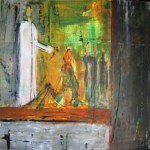Nellie is dealing, man! His perfect strike from right field in the 8th and his three-run jimmy jack to put it away in the 11th have given the Rangers complete command of this ALCS. Young finally drove in a run and appears to be slowly returning to form. Kinsler’s running the bases like a seasoned veteran. Mike Napoli’s still red-hot; his throw to nail Jackson, coupled with his catch and block at the plate on Cabrera, were things of sheer beauty and grace. And watching Wash running in place in the dugout as Hamilton rounded third made everything seem just as fun as last year. 
And: Is it a cobra or a sitting duck? What is that thing? Whatever it is, it’s not as cool as the claw and antlers.
~~~~~~~~~~~~~~~~~~
 Jesus and the Church today don’t attract the same people. That’s a problem, right? While he was ministering on this earth in our flesh, Jesus seemed to attract a certain kind of people. But his Church today seems to repel those kinds of people and attract others.
Jesus and the Church today don’t attract the same people. That’s a problem, right? While he was ministering on this earth in our flesh, Jesus seemed to attract a certain kind of people. But his Church today seems to repel those kinds of people and attract others.
In just about every Gospel account, anytime Jesus met up with a religious leader or a well-respected pillar of the community, they were offended by the Son of God. They were repulsed by Jesus. Threatened, even. But those who were on the margins of society, those who had no power or status or wealth, were intrigued by Jesus. They were attracted to him. The outcast is always the one who connects with Jesus. Those are the ones coming to Christ. The city rulers and “church” leaders were the ones trying to put Jesus down, trying to kill him.
Our experience today seems to be just the opposite.
Timothy Keller, in his little book The Prodigal God, speaks to this as he compares and contrasts the two lost sons in the Luke 15 account of Jesus’ most well-known parable. (What? You’ve never read Timothy Keller? Oh, my. Look, as soon as you’re finished reading and commenting on this blog post, the very moment you’re done, click here and buy Keller’s The Reason For God. And when it arrives, read it!) The younger son types were always attracted to Jesus while the older brother types were cynical and suspicious. But that’s not the way things are in our American churches today:
“Jesus’ teaching consistently attracted the irreligious while offending the Bible-believing, religious people of his day. However, in the main, our churches today do not have this effect. The kind of outsiders Jesus attracted are not attracted to our contemporary churches, even our most avant-garde ones. We tend to draw conservative, buttoned-down, moralistic people. The licentious and liberated or the broken and marginal avoid church. That can only mean one thing. If the preaching of our ministers and the practice of our parishioners do not have the same effect on people that Jesus had, then we must not be declaring the same message that Jesus did. If our churches aren’t appealing to younger brothers, they must be more full of elder brothers than we’d like to think.”
What kind of a message are we sending when we relegate the poor of our community to a back room downstairs? What are we saying when the Hispanic church can meet in our building, but only after we’re finished with it? What do we communicate when the outcast feels more warmly welcomed at Wal-Mart and McDonald’s than he does at church? What’s the “gospel” we proclaim when we’re quick to hand a guy a five dollar bill for lunch but avoid like the plague the thought of ever actually inviting that guy to our homes for dinner?
That’s a problem, right?
If we ever came to the conclusion that acting like our Lord — doing Christ-like things in Christ-like ways — was the way to go and acting the opposite of our Lord was wrong, then things might change. But none of this will ever change a long as we think it’s OK the way it is. That’s a problem, right?
Peace,
Allan








Recent Comments